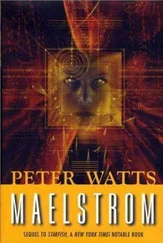He grabbed his goggles off the ATB and zoomed in. The tornado was the first thing to draw his eye—
—That thing’s going pretty strong for so late in the day—
—but off to the right, directly over the monastery itself, a puff of dark brown smoke roiled and drifted and dissipated in the lowering light.
The building didn’t seem to be damaged, though. At least, none of the façades he could see.
What are they doing over there?
Physics, officially. Cosmology. High-energy stuff. But it was all supposed to be theoretical; as far as Brüks knew the Bicameral Order didn’t perform actual experiments. Of course, hardly anyone did, these days. It was machines that scanned the heavens, machines that probed the space between atoms, machines that asked the questions and designed the experiments to answer them. All that was left for mere meat, apparently, was navel-gazing: to sit in the desert and contemplate whatever answers those machines served up. Although most still preferred to call it analysis .
A hive mind that spoke in tongues: that was how the Bicamerals did it, supposedly. Some kind of bioradio in their heads, a communal corpus callosum: electrons jiggling around in microtubules, some kind of quantum-entanglement thing. Completely organic to get around the ban on B2B interfaces. A spigot that poured many minds into one on command. They flowed together and called down the Rapture, rolled around the floor and drooled and ululated while their acolytes took notes, and somehow they ended up rewriting the Amplituhedron.
There was supposed to be some rational explanation to justify the mumbo jumbo. Left-hemisphere pattern-matching subroutines amped beyond recognition; the buggy wetware that made you see faces in clouds or God’s wrath in thunderstorms, tweaked to walk some fine line between insight and pareidolia. Apparently there were fundamental insights to be harvested along that razor’s edge, patterns that only the Bicamerals could distinguish from hallucination. That was the story, anyway. It sounded like utter bullshit to Brüks.
Still, you couldn’t argue with the Nobels.
Maybe they had some kind of particle accelerator over there after all. They had to be doing something that sucked a lot of energy; nobody used an industrial vortex engine to run kitchen appliances.
From behind, the metallic tinkle of displaced instruments. Brüks turned.
His scasers lay in the dirt. On the bench above them the gutted snake watched him upside-down from its dissecting tray, forked tongue flickering.
Nerves, Brüks told himself.
The discarded carcass shivered on its back, as if the gash down its belly had let in the cold. Flaps of tissue rippled along either edge of that wound, a slow peristaltic wave undulating along the length of the body.
Galvanic response. That’s all it is.
The snake’s head lurched up over the edge of the tray. Glassy, unblinking eyes looked this way and that. The tongue, red-black, black-red, tasted the air.
The animal crawled from the pan.
It wasn’t having an easy time of it. It kept trying to roll and crawl on its belly but it didn’t have a belly, not any more. The ventral scales that would have pushed it along, the muscles beneath had been sliced apart, every one. And so the creature would manage a half twist every now and then, and fail, and resort to crawling on its back: eyes wide, tongue flicking, insides emptied.
The snake reached the edge of the bench, feebly wavered a moment, dropped into the dust. Brüks’s boot came down on its head. He ground it deep against the rocky soil until there was nothing left but a moist sticky clot in the dirt. The rest of the creature writhed, its muscles jumping to the beat of nerves jammed with noise and no signal. But at least there was nothing left that could possibly please-God feel .
Reptiles were not especially fragile creatures. More than once Brüks had found rattlesnakes on the road hours from the nearest vehicle, spines crushed, fangs shattered, heads reduced to bloody paste—still moving, still crawling for the ditch. The kill sack was supposed to prevent that kind of protracted agony. You turned the animal’s own metabolism against it, let lungs and capillaries carry the poison to every cell of every tissue, bringing a quick and painless and—most of all—a complete death, so that it would not wake up and fucking look at you, and try to escape, an hour after you’d scraped its insides away.
Of course there were zombies in the world now. Vampires too, for that matter. But the twenty-first century’s undead were strictly Human. There was no reason why anyone would want to build a zombie snake. This had to be another contamination artifact; some accidental genetic hack that shut down the MS receptor sites, maybe triggered a rogue suite of motor commands. Had to be.
Still.
He’d really hoped the ghosts would be easier to handle out here.
There weren’t nearly as many ghosts in the desert, for one thing. For another, none of them were human. Sometimes he wished he could feel half as much for the thousands of people he’d killed.
Of course, basic biology explained that particular double standard as well. He hadn’t had to face any of his human victims, hadn’t looked into their eyes, hadn’t been there when they’d died. The gut was not a long-range organ. Its grasp of culpability degraded exponentially with distance; there’d been so many arcane degrees separating the actions of Daniel Brüks from their consequences that conscience itself entered the realm of pure theory. Besides, he’d hardly acted alone; the guilt diffused across the whole team. And their intentions, at least, had been beyond reproach.
Nobody had blamed them, not out loud, not really. Not at first. You don’t pass judgment on the unwitting hammer used to bash in someone’s skull. Brüks’s work had been perverted by others intent on bloodshed; the guilt was theirs, not his. But those perpetrators remained uncaught and unpunished, and so many had needed closure in the meantime. And the distance between How could they and How could you let them was so much smaller than Brüks had ever imagined.
No charges had been pressed. It wasn’t even enough to revoke his tenure. As it turned out, it was only enough to wear out his welcome on campus.
Nature, though. Nature always welcomed him. She passed no judgments, didn’t care about right or wrong, guilt or innocence. She only cared about what worked and what didn’t. She welcomed everyone with the same egalitarian indifference. You just had to play by her rules, and expect no mercy if things didn’t go your way.
And so Dan Brüks had put in for sabbatical and filed his agenda, and headed into the field. He’d left behind his sampling drones and artificial insects, packed no autonomous tech to rub his nose in the obsolescence of human labor. A few had watched him go, with relief; others kept their eyes on the sky. He left them, too. His colleagues would forgive him, or they wouldn’t. The aliens would return, or they wouldn’t. But Nature would never turn him away. And even in a world where every last sliver of natural habitat was under siege, there was no shortage of deserts. They’d been growing like slow cancer for a hundred years or more.
Daniel Brüks would go into the welcoming desert, and kill whatever he found there.
He opened his eyes to the soft red glow of panicking machinery. A third of the network had just died in his sleep. Five more traps went down as he watched: a booster station, suddenly offlined. Twenty-two beeped plaintively a moment later—proximate heat trace, big, man-size even—and dropped off the map.
Instantly awake, Brüks played the logs. The network was going down from west to east, each dead node another footfall in a growing trail of dark ragged footprints stomping across the valley.
Читать дальше








